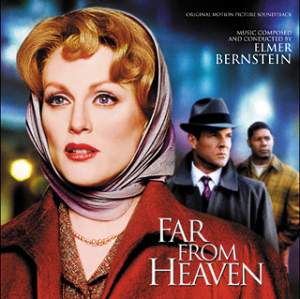************************************************************** EDITOR’s RECOMMENDATION January 2003 **************************************************************
Far From Heaven
Music composed and conducted by Elmer Bernstein
Piano by Cynthia Millar
Orchestrations by Emilie A. Bernstein
The Hollywood Studio Symphony
Available on Varèse Sarabande Records (VSD-6421)
Running Time: 46.22
Crotchet Amazon UK Amazon US

Name a still working film composer who was already established on the Hollywood A list by 1957? There is only one answer, and for Far From Heaven, writer-director Todd Haynes has secured his talents for this evocation of the 1950's "women's picture". Inspired particularly by such Douglas Sirk features as The Wind Can Not Read, Far From Heaven is a recreation of a long lost style of cinema. It is not though, a winking pastiche, but a modern re-examination of both 1950's cinema and society, considering matters which could not be explored in films actually made during the time. It is 1957, Connecticut, and Julianne Moore's middle-class heroine discovers that her marriage is loveless, her husband, homosexual. She strikes up a friendship with her well educated African-American gardener, and soon she is ostracised by polite society.
When I spoke to Elmer Bernstein in the summer of 2002 he told me he was excited about this score, as it represented a rare contemporary opportunity to bring real emotion into modern film music. He also described how while the melodic material is completely different, the score in its lyricism and delicacy had something in common with his music for To Kill A Mockingbird (1962). This is very true, and although it is a full orchestral score Far From Heaven frequently has the intimacy and innocent directness of a chamber work, or even of folk music. Gentle, melancholy and introspective woodwind feature strongly; simply listen to the delicate 'Crying' to get a flavour of the score.
The music begins with solo piano, introducing 'Autumn in Connecticut', and distantly reverberant piano is a central core to the score, performed by Cynthia Millar, familiar to followers of the composer for her mastery of the Ondes Martinet. This is essentially a work dominated by variations on two themes, themselves closely related in character; wistful, nostalgic and plaintive, but with hidden strengths which rise to the surface at key moments. Though never overtly forceful a sense of optimism emerges from the shadows in 'Turning Point', while the jazzy dance of 'Miami' and the sleepy MOR of 'Cathy and Raymond Dance' point to warmer feelings. The only violence in the score comes with the brief, terse, aggressively urban jazz patterns of the piano in 'Stones', music not so far distant from the sound the composer brought to the cinema with The Man With the Golden Arm (1955).
Though based upon limited material and sporting a unified sound, the album never outstays its welcome, Bernstein fashioning wonderfully intimate moments such as the yearning strings of 'Revelation and Decision'. The climactic 'Beginnings' finally brings the piano to the fore in an understated almost mini-concerto style evocation of the 1940's, rather than the '50's. This flowering of romanticism takes a bold film maker and a resolutely assured composer to bring off without the safety net of post-modern irony. On album Bernstein certainly succeeds, in the closing moments making moving music without condescension, even if it is finally touched by one last moment of doubt. Surely one of the very few really significant film music achievements of the year, Far From Heaven will almost certainly stand as the last great film score of the 1950's.
Gary Dalkin
5
Return to Index